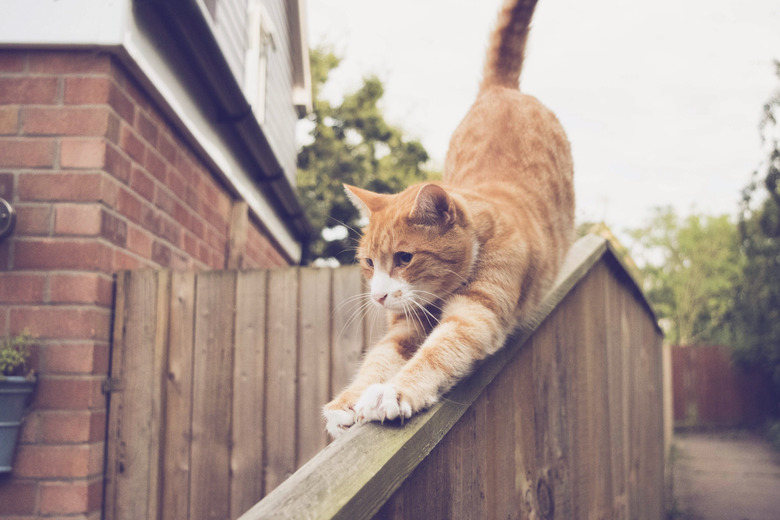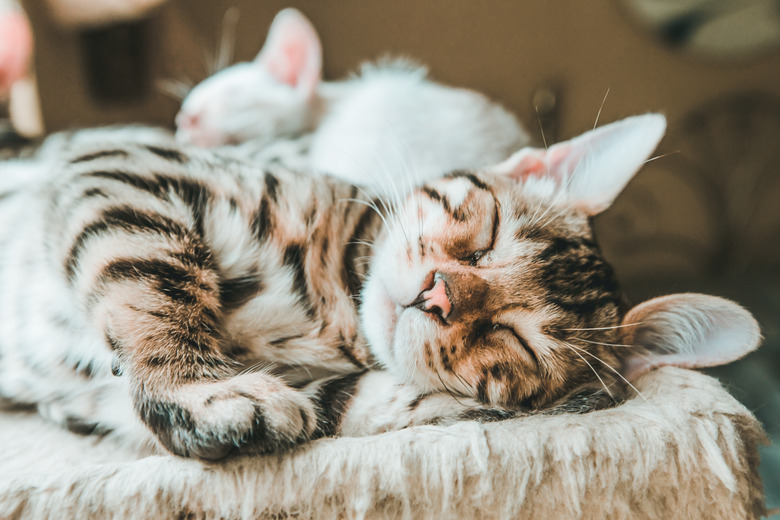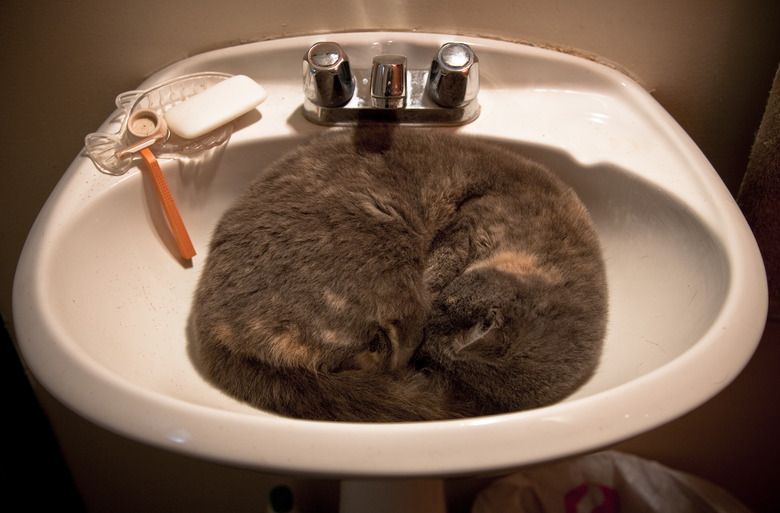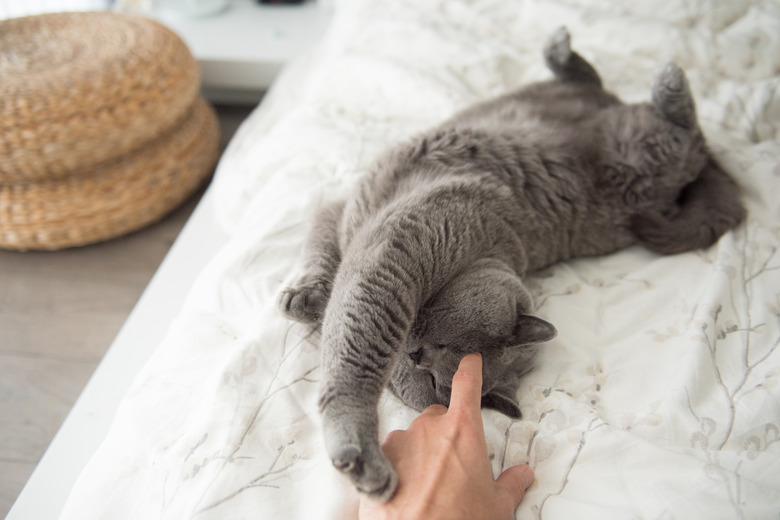Why Does My Cat Do That? 20 Puzzling Cat Behaviors Explained
Cats. They're amazing and majestic and so, so, so confusing. Here are some of the weirdest, most puzzling things cats do, followed by cat behavior explained in ways that make them kind of make sense.
1. Why does my cat walk between my legs?
1. Why does my cat walk between my legs?
There are a few reasons cats walk between your legs. When they're rubbing against your legs on the walk, they're doing something sweet and marking their territory. Your cat rubs against you to deposit her scent and stake her claim to you to the world. It's also a sign that your cat is happy and comfortable with you.
The same is true when cats wind through your legs; they are happy to be with you. While this may be another way of marking their territory, some veterinary behaviorists say it's more likely part of bunting, which is a show of affection for you, similar to when your cat bumps its head against your head. Now, if cats wind through your legs around feeding time, they could be nudging you as a subtle reminder that it's time to eat. Cats are not bred as herding animals like some dogs, but they have learned that this behavior is a way to get what they want.
2. Why does my cat love string so much?
2. Why does my cat love string so much?
Cats are obsessed with string, but ... why? It turns out, there are a lot of reasons for cats' string obsession. Of course, string is fun to play with and alleviates boredom and anxiety for cats, but there's even more to it than that. A string obsession is also an expression of your cat's wildest, killer instincts (believe it or not).
When a cat catches its dinner, it looks like the cat is "playing" with its food. The feline will pounce on the prey or push it around sheepishly with its paw. The cat is not actually playing or taunting its dying prey but making sure the prey is weak enough for final submission. This is the same "toying" we see cats do with string-like objects, whether they be yarn or long extension cords.
3. Why does my cat stretch all the time?
3. Why does my cat stretch all the time?
Cats are always stretching, and not because they're secret yogis. Mostly, they stretch for the same reasons we do: stretching increases blood flow and it feels good. People often stretch after being in one position for a while, such as when waking up. The brain paralyzes most muscles when cats (or their people) sleep so they don't go wildly acting out their dreams. But, instead of sleeping for many hours at night as people do, cats take naps throughout the day; that's where the term "catnap" comes from. So, naturally, they stretch after each nap.
Stretching can also be a warning to prey and other predators (or, at least, it was, back when your cat was wild and not pampered and living rent-free in your house). When a cat stretches, the muscle fibers are completely extended, so a stretchy cat is prepared to attack at any time. In the wild, cats will stretch to ward off predators and stake their claim over their prey. Because cats have the ability to remain immobile for such long periods of time, when they are ready to hunt or attack enemies, all they need is one good stretch to launch them into action!
4. Why does my cat meow?
4. Why does my cat meow?
We all know cats meow, but what's behind their trademark sound? First of all, cats know what they want, and they know that we puny humans can't understand their complex cat language. So they dumb things down into meows to get our attention.
Some say cats learn to meow just to get attention from their people. But newborn kittens meow to their mothers, so the behavior is clearly present right from the start. According to the American Society for the Prevention of Cruelty to Animals (ASPCA), cats sometimes meow just to say hello. They also meow to ask for something or to get attention for some reason, like dinner or affection. When cats meow what their owners consider to be excessive, however, and they've tried giving attention and food, a visit to the vet is in order to rule out illness or pain.
5. Why does my cat go to other houses?
5. Why does my cat go to other houses?
Cats are smart. When they go to a different house, it's not an accident, but it still feels weird for the humans who, you know, regularly feed and care for them. It could be that someone else is feeding them, too. If they go to the same house every time, talk to the resident to see if that's the case, and put a stop to it. Cats often wander to find mates, so see if another cat resides in the home they visit. Sometimes, it's a sense of wanderlust that keeps cats traveling a lot.
Senior cats can suffer from cognitive decline with symptoms a lot like Alzheimer's disease in humans, according to Senior Cat Wellness. Sadly, they may truly become confused about where home is. Signs to look for at home are long periods of staring into space, changes in sleep patterns, behavioral changes like aggression or clinginess, or going to the bathroom outside the litter box even when it's clean.
6. Why does my cat follow me to the bathroom?
6. Why does my cat follow me to the bathroom?
Does your cat follow you to the bathroom? If so, you're definitely not alone. There are several theories as to why your cat might follow you for your more private moments. First, cats are naturally curious, so they're bound to follow you just about anywhere, but especially anywhere that seems private. Cats also learn really quickly that you're a captive audience when you're on the toilet and, well, they like having your full attention.
More than that, though, your cat might feel vulnerable without you. Cats are predators, but they are also prey, and they are aware of that. Since you are a source of safety and comfort, they might feel less safe when you're behind closed doors, and prefer to accompany you to the bathroom, where they may continue to take advantage of the safety you provide.
7. Why does my cat hiss?
7. Why does my cat hiss?
One of the scarier sounds cats make is the hiss. But why do they make this intimidating noise? Unlike meows, which can mean several different things, hissing always means the same thing: distress.
A cat will hiss when she feels there is an immediate threat and is trying to defend herself with an intimidating warning. The hissing sound is a result of combined fear, confusion, unhappiness, and surprise. Adrenaline is flowing and the hiss sound comes out of sheer instinct.
8. Why does my cat ignore me when I call him?
8. Why does my cat ignore me when I call him?
We all agree that cats are smart, but sometimes they act like they don't know what we're saying when we call their names. What's up with that? Cats operate heavily out of instinct, with a concentration on survival. Because of this, their actions are self-motivated. They eat because they're hungry, not because we say, "Here kitty, kitty, it's dinner time!" Studies and cat owners will tell you that kitties are capable of high levels of affection and love. This does not necessarily mean they will do what we want them to do. They are essentially the moody teenagers of the domesticated animal kingdom.
Cats ignore humans because they were never bred or trained to listen and obey like dogs. Because cat behavior is based so much on natural survival instincts, they will not communicate if there is no need.
Cat mothers in the wild will only use vocal communication with their kittens as a warning or alert to danger. If there is no imminent danger or need to communicate, well, a cat is literally not going to waste her breath. Therefore, if you are calling out to your cat but they don't need anything from you at that moment, they are not likely to respond.
9. Why does my cat eat grass?
9. Why does my cat eat grass?
We buy our pets the best of the best of everything, including food. So why do cats eat grass? One reason cats eat grass is because it acts as a digestive aid. In the wild, cats often eat grass after consuming their prey. Cats don't have the enzymes to digest grass, so they sometimes vomit it back up, ridding their system of the indigestible parts of the prey. Our pet cats may not need to purge animal bones from their systems, but they do need to rid themselves of things like hairballs and other detritus that may be clogging up the works.
Eating grass is a natural instinct for cats and, contrary to popular belief, only 27 percent of cats frequently vomit afterwards. If you have an indoor cat, purchasing cat grass is a great way to get them some extra vitamins, minerals and fiber that aids digestion, as well as keep them entertained — many cats love batting it around in addition to eating it.
10. Why does my cat like to sleep on top of me?
10. Why does my cat like to sleep on top of me?
Cats love to sleep, and they love to sleep on top of their humans. Part of it has to do with comfort and security. Your cat feels safe with you and loves to be surrounded by your smell and the sounds of your heartbeat. They are more vulnerable when they're sleeping, so they choose someone they trust to sleep on. Consider it a compliment!
Cats are also obsessed with being warm, and the human body is a great source of heat. This may be why you might wake up with your kitty on your head, because your head is the warmest place!
11. Why does my cat bury his poop?
11. Why does my cat bury his poop?
Cats are very particular when it comes to their bathroom habits. One of their weirdest? Burying their poop. One thing it indicates is that domestic cats are submissive, at least relative to their wild ancestors. In the wild, dominant cats do not bury their poop. Leaving their droppings out in the open is a way of signaling that they wish to claim the territory. More submissive cats, on the other hand, do bury their poop as a way of ensuring that the dominant cats in the area don't feel threatened.
Cats also bury their poop to cover their tracks. Wild cats often bury their droppings to avoid drawing the attention of predators to themselves and their kittens. The instinct to cover their tracks remains strong in domestic cats. All cat poop smells pretty much the same to humans, but not to cats. They can distinguish between their droppings between those of other cats thanks to pheromones. Because their poop contains unique scents that identify one another, it's important to cats to bury their droppings so that potential predators cannot track them.
12. Why does my cat love to tear paper?
12. Why does my cat love to tear paper?
Cats are cute, but they can also be destructive, as anyone who has made the mistake of leaving a pile of important paperwork near a kitty can verify. Why do cats love to tear paper? They don't even have a "good" reason, honestly. Most cats tear paper because they're bored, and apparently destroying paper is a sure way to get out of the feline doldrums.
Tearing paper might also satisfy your cat's natural urges to hunt; cats tear up and rip off parts of their prey before eating them (yeah, gross). Cats that are experiencing anxiety are known to tear paper too. If your cat is trying to actually eat or ingest paper, though, take them to the vet to rule out any nutritional deficiencies or dental problems causing the behavior.
13. Why does my cat flick his tail?
13. Why does my cat flick his tail?
Cats have a lot of telling mannerisms. One of the hardest to decode can be the tail flick. That's because the tail flick can mean many different things. Here's a quick breakdown for your reference. If your cat is feeling playful, her tail will flick in a smooth motion. You've probably seen her do this when playing with a favorite toy. It could also signal idleness and contentment.
If your cat has relaxed eyes, ears in a neutral position, and a generally chill vibe while she's flicking her tail intermittently, she's probably feeling good just hanging out.
On the other hand, tail flicks can be a sign of negative emotions too. If your cat is flicking her tail in bursts, it may be a sign that she's becoming annoyed. If you see other signs of agitation, like dilated pupils or a crouched body, proceed with caution. Finally, if your cat is holding her tail low to the ground, extended in a rigid way while she flicks it back and forth rapidly, this may be a sign that she's feeling aggressive. You might see this behavior at the vet or other places that stress your cat out. If your cat's tail is puffed up, she's extra stressed and needs some space to calm down.
14. Why does my cat sleep all the time?
14. Why does my cat sleep all the time?
Cats love to sleep. That's why they do it SO. MUCH. (14-16 hours a day on average, which is just insane.) The first reason cats love to nap so much is because they can. Since Mother Nature made cats hunters with few natural predators of their own, they can afford to take long naps in relative safety.
Domestic house cats live even cushier lives than their African lion cousins — the reigning kings of the jungle — who spend most of their days safely sleeping in the open savannah when not hunting their next meal. Since we're on the subject of hunting, cats big and small expend a great deal of energy in a very short amount of time when stalking, running, and pouncing on prey (even if that prey is just a catnip mouse toy!). These concentrated bursts of energy make rest and recuperation a necessity.
Also, it's important to keep in mind that cats are very light sleepers (but, of course, you already know that if you're a cat owner). Even dozing, cats have the ability to remain aware of their surroundings (mainly through sound and scent) in the event they have to escape from danger or pounce on prey at a moment's notice.
References
- I Heart Cats: Ask a Vet: Why Does My Cat Rub Around My Legs?
- DW: Cats Are Neither Mean nor Cruel
- Wonderopolis: Why Do Cats Stretch So Much?
- ASPCA: Meowing and Yowling
- Senior Cat Wellness: Why Do Cats Visit Other Homes?
- I Heart Cats: Ask a Vet: Why Does My Cat Follow Me to the Bathroom?
- Cat Behavior Associates: Why Cats Hiss
- Pets4Homes: Why Do Cats Ignore You When You Are Calling Them?
- Tractive: Why Do Cats Eaat Grass and How Does it Affect Them?
- LiveScience: Why Do Cats Always Cover Their Waste?
- Care.com: Why Do Cats Wag Their Tails?
- Catster: Why is Your Cat Licking You?
15. Why does my cat groom herself so much?
Cats love to groom themselves. When they're not sleeping (which is rare), they're often grooming themselves. They aren't just neat freaks though. Some cats are comforted by regular grooming — you know, the way you always feel fresh after a shower.
But, like so many things animals do, it's partly a survival mechanism. Cats groom themselves regularly to remove odors that predators might pick up on. They also groom as a way to cool down. Unlike humans, felines have a minimal ability to sweat; the majority of sweat glands are located around the paw pads. The rest of their body helps stay cool thanks to the process of saliva evaporation on their fur. This helps maintain body temperature and accounts for approximately a third of a cat's cooling process.
16. Why does my cat sleep in the sink?
Of all the weird places cats like to sleep, the weirdest might be the sink. Cats seem to love to nap on the smooth porcelain, but why? One reason might be that your cat wants to be a part of your daily rituals. Cats learn our routines and if yours involves going to the bathroom in the morning, your cat may just be trying to position himself close to you.
It's also a temperature thing. Cats regulate their body temperature by sleeping next to cool or warm surfaces. Not only is your porcelain or ceramic bound to cool down a cat's core temperature, sinks are also a great round shape that mold well to your kitty's curled positions.
17. Why does my cat sleep on my face?
Okay, so the actual weirdest place your cat likes to sleep might be on your face. On the one hand, your face is a warm, cozy place where your cat feels safe. It's also a great chance for your cat to mark you with his scent and let all other cats in the world know that you are spoken for.
In fact, if snuggling on or around your neck and face isn't your cat's routine nighttime behavior, you might be neglecting some of his routine care. Did you leave his water bowl nearly empty or forget to leave out some midnight munchies? Is the litter box in need of cleaning? Your cat might be standing on your face because it's the only way to get your attention or catch up with you if you're particularly busy. He can't text you a low food alert, after all.
18. Why does my cat knead?
Cats do a lot of quirky things, but one of the strangest is their need to knead. The most commonly-stated reason for kneading is that it's a kitten behavior that is carried into adulthood. Kittens knead on their mothers during suckling — an action thought to help milk flow. Some adult cats also suckle the object that they're kneading (blanket, pillow, etc), oftentimes purring loudly and working themselves into a seemingly blissful, zen-like state.
Cats also knead to leave their scent behind and to make a place comfortable to sleep. If you have a female cat, you might also notice that she kneads a lot before going into heat — it's a way to signal to male cats that she's ready for their advances.
19. Why does my cat roll around after mating?
Cats mate very quickly (penetration lasts three to 20 seconds). Immediately after mating, the female cat rolls around and will lick at her genital area and at her back where the male cat touched her. This may be due to the hormones responding to ovulation, or to clean the scent of the tom from her coat before she accepts another mating, which could be just 30 minutes later.
20. Why does my cat lick me?
Cats don't always show a ton of affection, so it's an extra special gesture when they do. Generally speaking, it's a good thing if your cat is licking you. According to cat behavioral specialist Rita Reimer, kitties typically lick themselves for general grooming and survival purposes. When they lick others in their vicinity, cats are signaling that they accept you and are attempting to promote a bond.
Cats may lick with the hopes of getting groomed or pet in return. Reimers says that sometimes they just do it for the sake of affection, and some cats can even be trained to give kisses willingly when asked.



